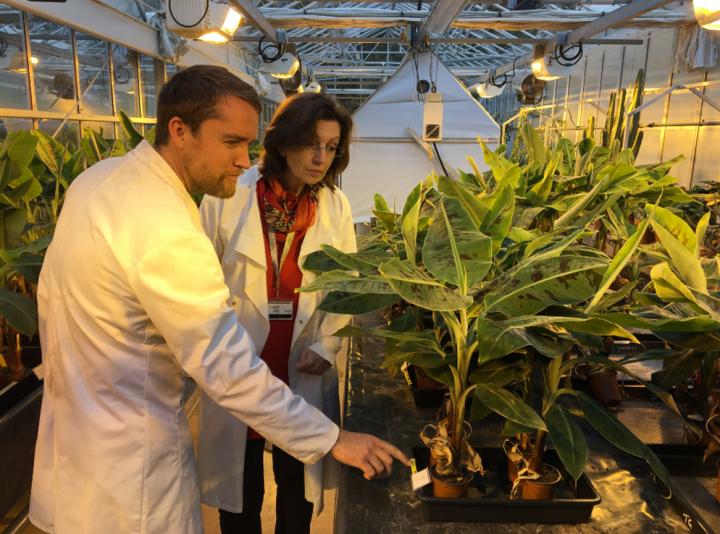
Credit: University of Exeter
Amongst the world’s most challenging problems is the need to feed an ever-growing global population sustainably.
Securing the food supply is of paramount importance, and more attention must be given to the threat from fungal pathogens competing with us for our own crops.
We need to raise awareness of this fact across all of society – from politicians to the general public.
Research at the University of Exeter has a strong emphasis on understanding fungal plant disease and in developing new ways to protect our crops.
In a new article, published in Nature Food this week, led by Professor Sarah Gurr and Dr Helen Fones (UKRI Fellow), a consortium of world-leading Exeter-based fungal researchers has merged their expertise to highlight the threat of fungal disease for our food security.
Professor Gurr said: “Over the past centuries, crop diseases have led to the starvation of the people, the ruination of economies and the downfall of governments.
“Today, the threat to plants of fungal infection outstrips that posed by bacterial and viral diseases combined.
“Indeed, fungal and oomycete diseases have been increasing in severity and scale since the mid 20th Century and now pose a very serious threat to global food security.
“We face a future blighted by known adversaries, by new variants of old foes and by new diseases.
“Modern agricultural intensification practices have heightened this challenge.
“Moreover, climate change compounds the saga as we see altered disease demographics – pathogens are on the move, as shown so elegantly by Professor Dan Bebber and PhD student Tom Chaloner (co-authors).”
Dr Helen Fones said: “Our review looks to the future; summarising our main challenges and knowledge gaps, and highlighting the research needed to face the threat of emerging crop pathogens.
“We consider this challenge in terms of both the crops essential for providing calories and those commodities that fuel global trade and the global economy that we rely upon.
“We show that in this increasingly interconnected world we must be prepared, with more robust agricultural systems, to weather pathogen outbreaks that might impact food production either in individual countries or around the globe.
“From writing the article to its publication, COVID-19 has arisen and demonstrated how deeply affected we can all be by outbreaks of new pathogens.
“This reminds us that we need to make agriculture less reliant on fungicides which are also used to treat fungal infections in humans, as this can lead to resistance moving from agricultural to clinical settings (as highlighted in an article in Science in 2018, authored by Sarah Gurr, with Mat Fisher from Imperial College).
“Here, we discuss the need for new fungicides, especially ones that have complex modes of action, and are harder for the pathogen to develop resistance to.”
But not all is “doom and gloom” as illustrated in recent work, led by co-author Professor Gero Steinberg.
In a recent publication in the journal Nature Communications, Exeter scientists described the development of a new fungicide, which holds the potential to help protect our food crops against fungal pathogens.
Professor Steinberg said: “The challenge of fungal crop diseases is enormous.
“With the help of the BBSRC and the University of Exeter, Sarah Gurr’s and my research group are following a dual strategy: to raise awareness, illustrated by this article in Nature Food, and also to develop new ‘weapons’ in our fight to secure global food security.”
###
Media Contact
Alex Morrison
[email protected]
Related Journal Article
http://dx.




